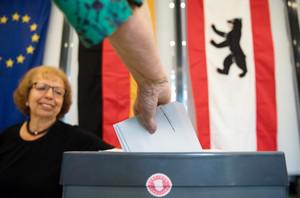The Russian connectionRussia’s hacking, disinformation efforts aim to influence German, French elections
Russian government hackers and disinformation specialists were successful in their hacking and disinformation campaign in the run-up to the November 2016 election in the United States. “I think one of the lessons that the Russians may have drawn from this is that this works,” FBI director James Comey told lawmakers on Tuesday. German and French intelligence services agree with Comey. They say they have detected an intensification of Russian hacking and disinformation efforts in the run-up of the second round of France’s presidential election – to be held this coming Sunday – and Germany’s federal election, to be held in September. In both Francde and Germany, Russia’s campaign aims to strengthen populist, far-right, ultra-nationalist, and anti-American politicians and parties.

Worries that Russia will try to influence the German and French elections // Source: theconversation.com
Russian government hackers and disinformation specialists were successful in their hacking and disinformation campaign in the run-up to the November 2016 election in the United States. FBI director James Comey, speaking in a Senate hearing Tuesday, said he had no illusions that the Obama administration’s response measures would deter Russian government hackers from future American elections, either. “I think one of the lessons that the Russians may have drawn from this is that this works,” Comey told lawmakers on the Senate Intelligence Committee. “I expect to see them to come back in 2018, and especially in 2020,” for the next U.S. presidential election.
The Russian government has been engaged in a broad effort to influence elections in other countries as well.
Hans-Georg Maassen, head of the BfV, Germany’sdomestic intelligence agency, said he expects new cyberattacks by Russian government hackers on politicians and government officials ahead of Germany’s September federal elections.
Maassensaid that Germany’s intelligence agencies are keeping a “very close watch” on cyberthreats as the country prepares for the September vote.
“We expect further attacks, and we are keeping a very close watch on the threats,” Maassen told a cybersecurity conference in Potsdam.
“We are finding increasingly aggressive cyber espionage.”
Saarbrücker Zeitung reports that Maassensaid his agency had spotted and thwarted repeated email phishing attacks directed at the conservative CDU/CSU party – the party’s leader, Chancellor Angela Merkel, is running for her fourth term — and other hacking attempts targeting politicians and institutions who are critical of Moscow.
Maassen said that hackers — from Russian government-affiliated hacking group APT28, APT29, and APT10 — seized “large amounts of data” in a May 2015 attack on the Bundestag, and that German law enforcement and intelligence authorities are now worried that the information – some of it genuine, some of it doctored by Russian specialists — could now be used to influence the vote.
As was the case with the information stolen by Russian government hackers from the Democratic National Committee (DNC) and the Clinton campaign, Russia is likely to use Wikileaks and other pro-Russian websites to release the information to undermine the election prospects of politicians deemed critical of Russia, while helping two anti-American and pro-Russian parties – the populist, far-right, and ultra-nationalist Alternative für Deutschland (AfD) and the neo-Nazi Nationaldemokratische Partei Deutschlands (NPD).
